EC Names Alphabet, Apple, Meta, Microsoft Among DMA Gatekeepers

Twenty two tech core platform services from six DMA ‘gatekeepers’ are officially named by the European Commission
The European Commission has officially designated six ‘gatekeepers’ of online services that are subject to its Digital Markets Act (DMA).
The EC announced that Alphabet, Amazon, Apple, ByteDance, Meta, Microsoft are DMA gatekeepers, with a total of 22 core platform services from them also being designated.
It was back in July 2022 when the European Parliament voted to adopt Digital Markets Act (DMA) and Digital Services Act (DSA) – landmark rules that impose significant regulatory burdens on tech platforms.

DMA Gatekeepers
The ‘gatekeepers’ for the EU’s Digital Services Act (DSA), which focuses on how platforms handle user data and moderation and it went into effect late last month, were revealed earlier this year.
But now the European Commission has designated 22 services of six major tech companies as “gatekeepers” of online services as part of the DMA.
Companies face fines of up to 10 percent of annual global turnover for DMA violations and 6 percent for contravening the DSA.
Under the DMA, which came into force in November, companies with more than 45 million monthly active users and a market capitalisation of 75 billion euros ($82 billion) are considered gatekeepers providing a core platform service.
According to the European Commission, the following are now designated as gatekeepers for ‘core platform services’:
- TikTok (social network);
- Facebook (social network);
- Instagram (social network);
- LinkedIn (social network);
- WhatsApp (messaging);
- Messenger (messaging);
- Google Maps (intermediation);
- Google Play (intermediation);
- Google Shipping (intermediation);
- Amazon Marketplace (intermediation);
- Apple App Store (intermediation);
- Meta Marketplace (intermediation);
- Youtube (video sharing);
- Google (ads);
- Amazon (ads);
- Meta (ads);
- Chrome (browser);
- Safari (browser);
- Google Search (search);
- Google Android (operating system);
- iOS (operating system);
- Windows PC OS (operating system);
The European Commission also said it opened four market investigations to further assess whether Microsoft’s and Apple’s submissions that argued, despite meeting the thresholds, do not qualify as gateways.
Earlier this week it was reported that Apple and Microsoft were privately (and separately) arguing that their services aren’t large or powerful enough to justify earning similar gatekeeper restrictions under the Digital Markets Act.
The following are now under investigation:
- Microsoft: Bing, Edge and Microsoft Advertising;
- Apple: iMessage
The Commission also said opened a market investigation to further assess whether Apple’s iPadOS should be designated as gatekeeper, despite not meeting the thresholds.
In addition, the Commission concluded that, although Gmail, Outlook.com and Samsung Internet Browser meet the thresholds under the DMA to qualify as a gatekeeper, Alphabet, Microsoft and Samsung provided sufficiently justified arguments showing that these services do not qualify as gateways for the respective core platform services.
Therefore, the Commission decided not to designate Gmail, Outlook.com and Samsung Internet Browser as core platform services. It follows that Samsung is not designated as gatekeeper with respect to any core platform service.
Following their designation, gatekeepers now have six months (until March 2024) to comply with the DMA requirements.
Gatekeeper pushback
Microsoft and Apple are not the only firms to have pushed back against gatekeeper designations.
In July it emerged that Amazon was refusing to accept a gatekeeper designation from European officials, after German online retailer Zalando sued the European Commission over the same issue in June.
Amazon had argued that it is not the largest retailer in any of the EU countries where it operates and that its bigger rivals in these countries have not been designated as such.
Nevertheless Amazon has already taken steps to comply with the act and has reportedly “created a new channel for submitting notices against suspected illegal products and content”.